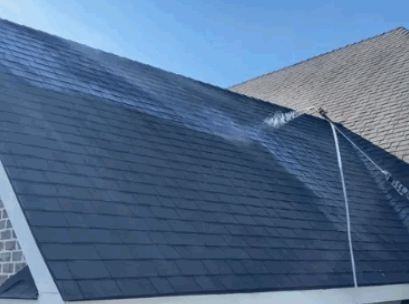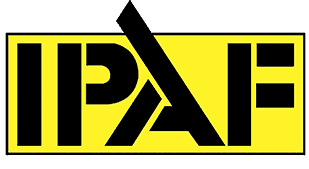Roof cleaning is an essential element of home maintenance. It extends the lifespan of your roof, prevents the need for costly repairs, and helps your home to look its best. Soft wash roof cleaning is an effective method for removing dirt and organic growths that are gentle on your roof tiles. Read on to find out everything about soft wash roof cleaning and why it is very often the best choice for roofs of all kinds.
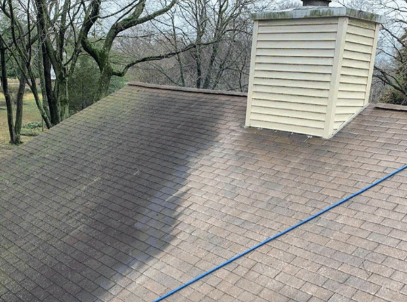
Soft washing is a low-pressure washing technique that uses water and a cleaning solution mixture to safely remove moss, dirt, algae, and lichen from roofs.
Take a look at our post "How to clean roof moss".
The soft washing method uses a low-pressure water application system. It usually has a pressure that is less than 500 PSI (pounds per square inch), which is significantly less pressure than pressure washing.
The low-pressure stream is enough to evenly distribute a cleaning solution across the entire roof.
Soft washing is a safer alternative to pressure washing or power washing. When using a pressure washer to clean a roof, you would usually use a PSI between 1,200 and 1,500. Many roofing materials, like clay tiles or asphalt, are highly susceptible to damage from these pressures.
Soft washing minimises the risk of these roof materials cracking, lifting, or chipping.
Check this out "How to clean roof tiles without a pressure washer".
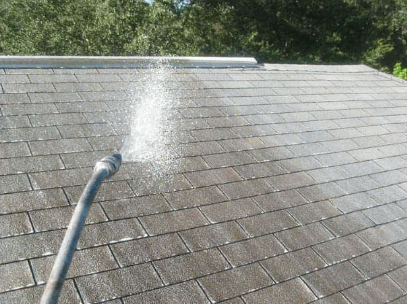
Most soft washing will use specially formulated, biodegradable cleaning solutions, made from eco-friendly ingredients like sodium hypochlorite. These solutions are effective at breaking down dirt, algae, mould, moss, lichen, and other growth.
The cleaning solution will usually have a mix of ingredients that accomplish different tasks, including:
When you clean a roof, the water and the cleaning solution used has to go somewhere. And this is most often onto the surrounding area and into the nearby drainage system. If harsh chemicals are used, this can have a negative impact on the local water, plant, and animal life.
Biodegradable and eco-friendly cleaning solutions are harmless to the local environment, so you don't need to worry about the impact your roof washing will have.
When soft wash roof cleaning, there is a high level of control over the amount of water being used. The water flow can be easily adjusted so that just enough is being used to clean the roof, and no more.
High-pressure washing uses a large amount of water, and this can often overload the roofing materials. Water saturation can damage the roofing materials, and will have an impact on the local environment. By precisely controlling the amount of water being used, the risk of water damage is lowered, and the local water system is less overloaded with wastewater.
Let's take a closer look at the soft washing method. Professional roof cleaning services are your best bet when it comes to roof cleaning. While you can attempt it yourself, any work on a roof is dangerous because of the height and risk of slips and falls, and you also risk damaging the roofing materials. A professional roof cleaning company has the training, tools, and experience to safely clean roofs without hurting themselves or damaging the roof.
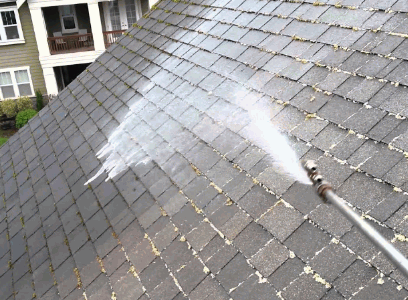
Before any cleaning happens, a thorough professional assessment of the roof should be done first. This is to check for any signs of structural weakness, cracks, leaks, or other damage. And to identify any areas of moss growth.
Any sensitive elements in the surrounding area, such as outdoor furniture and plants, will be covered with plastic sheeting to prevent them from getting covered in water and the cleaning solution.
The cleaning solution will be mixed ready for application. Then it is applied to the entire roof surface using a low-pressure sprayer. It is applied from the top of the roof to the bottom to avoid streaking and water pooling.
If there are any heavily soiled areas or areas with thick moss growth, a second pass of the cleaning solution can help to break the dirt down and kill the moss.

The cleaning solution is left to sit for a certain period of time. Depending on the solution and the condition of the roof, this could be anywhere from 15 minutes to 45 minutes.
The roof will be monitored during this period to make sure that the cleaning solution is doing its job.
After the solution has had time to work, a low-pressure rinse is used to wash away all of the dissolved grime, algae, and moss. It also removes all the cleaning solution from the roof.
If the run-off could damage the surrounding area, it can be controlled to direct it to specific points.
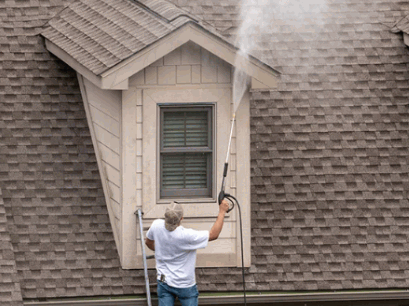
Sometimes there are tough stains or stubborn thick areas of moss that may need additional treatment. These will be given a second, targeted application of the cleaning solution, followed by another low-pressure rinse.
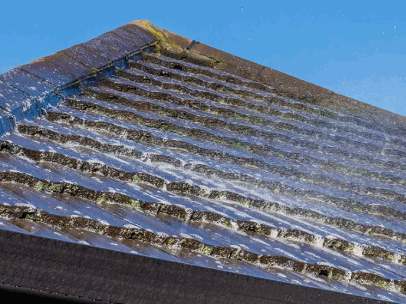
A final inspection is done to ensure that the roof is completely clean and that it is in good condition. Then all the protective covers and equipment are removed.
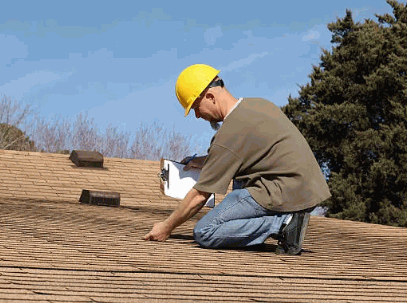
A regular soft wash roof cleaning schedule will protect your roof and prevent damage. Generally, you should soft wash your roof every one to three years, but the exact frequency will depend on a variety of factors, including the roofing materials, and your location.
If you notice any visible dirt, moss growth, or discolouration, you should book in a soft wash even if it's not due yet. Getting it cleaned sooner rather than later will minimise the risk of damage.
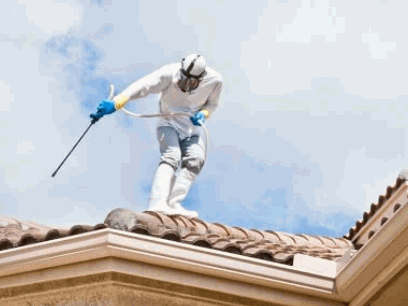
It is almost always better to bring in a professional cleaning company to soft wash your roof, rather than attempting a roof cleaning project yourself.
Working on a roof is dangerous, especially when working with slippery materials like moss, water, and detergent. A professional roof cleaning company will have had specific training in the correct safety protocols for working on roofs, and will have high-quality safety equipment that they know how to use.
Professional roof cleaning technicians have the training and experience to adapt their cleaning to the roof type, dirt type, and level of moss. They also know how to create a cleaning solution that will work in each specific circumstance, and the most effective method for cleaning.
Because of this, it is more likely that your roof will be thoroughly cleaned and protected when the soft wash is done by a professional.
Roofing materials are delicate, and roofs are precisely constructed to ensure that water drains away as it should and that the underlying roof structure is kept sealed. It is easy to accidentally damage roof tiles, or other elements of the roof, and this could have disastrous results.
If the water can't drain away as it should, this could lead to water pooling in the wrong area, which can cause leaks and water damage. If the roofing structure is exposed, water can damage the roofing materials, which could eventually lead to structural issues.
A professional cleaning company will know how to soft wash a roof without causing any damage.

If your roof needs cleaning, or you're ready to create a regular cleaning schedule, we can help. Our professional roof cleaning process ensures that your roof is gently yet thoroughly cleaned, using high-quality soft wash roof cleaning methods.
We are dedicated to ensuring that your roof is cleaned to the highest professional level, extending its lifespan, reducing the risk of damage, and helping it to look its best for longer.
Our soft wash cleaning methods are gentle on roof tiles, but will effectively remove all types of dirt, grime, moss, and algae. We understand that no two roofs are the same, so we always carefully inspect and monitor throughout the process to ensure your roof is protected the entire time.
Soft wash roof cleaning is a method of removing dirt and organic stains and growth from roofs, without the risk of damage that is present in high-pressure cleaning methods. A soft wash system uses low-pressure water and effective cleaning solutions to gently lift dirt and moss from the roof, without damaging the tiles. This is especially important for more fragile tile materials or older roofs.
